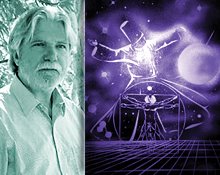
By MINE CAKAR
Published: Thursday, March 02, 2006
zaman.com
Mevlana Jalaladdin Rumi is a river flowing strongly for centuries… This river, whose love surpasses centuries and whose call of truth exceeds borders, remains a fountain for burning hearts.
Mevlana and his philosophy of Sufism, known as "Rumi" in the West, are becoming more popular as sales of his books pass that of Shakespeare in America. What is the motive behind these developing dynamics in the West? Why does this wisdom tree rooted in the East bear fruits in the lives of Westerners? Does it migrate from ungrateful lands to the places where it will be appreciated, as the truth cannot disappear?
American Mawlavi Sheikh Kabir Helsinki draws our attention to the fact that Rumi's harmonizing of human nature with spirituality is a new phenomenon for Westerners, as they tend to adopt the opposite. The Sheikh explains the origins of his interest in Rumi: "Rumi adopts humanity in all his attitudes. Islamic Sufism handles the human being with his misery and sorrow, as well as his craving for God; and this feature enables growth. Rumi is the voice of fascination and universal love. This passion and energy is very new for the West because spiritual tendencies are considered against and rejecting of life. However, Rumi is a great believer in life. Rumi represents a healing power and repairs the broken human heart, enabling us to feel close to God and human at the same time."
Helminski’s study of Hinduism and Buddhism
Kabir Helminski's life is an example of the attraction garnered by Rumi in the West. Helminski was brought up catholic but rejected Christianity at 17 and began researching Hinduism and Buddhism. His "searching" attitude drew him to Rumi and "Sufism." It was his first encounter with the concept of love, unlike his previous researches. Helminski says, "Rumi is a great master of love and his principles are supreme", adding he was attracted by Rumi's combination of humanly and divine things. Helminski, also a poet, senses the extraordinary beauty in Rumi's poetry and employs to discover him through his poetry. He learns Persian initially to become closer to the essence. Helminski founds a publishing house and publishes Open Secret, a book by Coleman Barks, also a famous name that translates Rumi into English.
Mawlawi Dargah has 200 dervishes worldwide, with 25 in California under Sheikh Helminski. There are Muslims from countries such as Turkey, Iran, and Indonesia in the group formed by Americans. Helminski says: "We have studied the Quran in addition to the works of Rumi for 25 years. We are trying to think, worship and withdraw into solitude, along with trying to form suitable relationships and associations. We conduct our daily tasks such as cooking, cleaning and serving guests besides spiritual education. We become more important in our love for God through our hopes; being awake, alert and conscious. Rumi is a great teacher and this kind of education nourishes the heart. It is an ever-lasting and a never-ending education. We are all students and there is no end to learning, it keeps improving our souls." Helminski compares Rumi to a river and says we are carried by its flow, where this power can create miracles.
Understanding Mevlana Celaleddin-i Rumi
Helminski says some people have a vague understanding of Rumi,and lists ways to help to understand him: “You cannot understand Rumi unless you make sacrifices and adapt yourself to a discipline to transform the self. No matter whether you are in the US or Turkey shallow thinking stays with you. We should awaken ourselves and begin on the road to spiritual development. This cannot be achieved by alone. It can be achieved through tradition and organized activities, which contain disciplines and are instructor-controlled, because it is difficult to maintain the promises alone and keep the intention alive. We should find those with same intention, work, and be part of a school of love.” Helminski stresses that Rumi cannot be separated from the Quran and Islamic tradition, and says, they do not have coercive attitudes, like making demands on those who attend their meetings.
Helminski, who rose from Mawlawi studentship to sheikhdom in 1990 and visited Turkey over 25 times, was mainly taught by Turkish teachers. His first sheikh was Suleyman Dede, and Sefik Can was one of his teachers. Helminski, expressed his gratitude to his teachers, and said he learnt much from Sufi tradition in Turkey, “especially decency,” he says. Helminski’s advice to us is to value the sources of our culture and to understand the spiritual roots of it; he lists in his recommendations such issues as: “Do not let materialism and technology distract you. Our biggest goal in life is education and how to improve our humanity since it is extremely important how we live our lives and improve our spirit in order to lead a better life both in this world and in the eternal life.”
Source: www.zaman.com
























